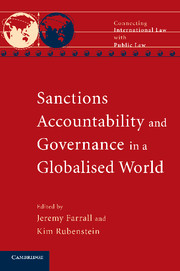Book contents
- Frontmatter
- Contents
- Contributors
- Series editors' preface
- Editors' preface
- Introduction: Filling or falling between the cracks? Law's potential
- PART I Setting down the foundations
- 1 Whose public? Which law? Mapping the internal/external distinction in international law
- 2 The potential for a post-Westphalian convergence of ‘public law’ and ‘public international law’
- PART II Internationalising public law
- PART III Implementing Security Council sanctions
- PART IV The place of corporations
- PART V The role of lawyers
- PART VI Public law and public policy
- PART VII Parallel case studies
- Concluding remarks
- Bibliography
- Index
2 - The potential for a post-Westphalian convergence of ‘public law’ and ‘public international law’
Published online by Cambridge University Press: 05 October 2010
- Frontmatter
- Contents
- Contributors
- Series editors' preface
- Editors' preface
- Introduction: Filling or falling between the cracks? Law's potential
- PART I Setting down the foundations
- 1 Whose public? Which law? Mapping the internal/external distinction in international law
- 2 The potential for a post-Westphalian convergence of ‘public law’ and ‘public international law’
- PART II Internationalising public law
- PART III Implementing Security Council sanctions
- PART IV The place of corporations
- PART V The role of lawyers
- PART VI Public law and public policy
- PART VII Parallel case studies
- Concluding remarks
- Bibliography
- Index
Summary
Introduction
I have previously argued that the separation of ‘public law’ and ‘public international law’ is dependent on Westphalian notions of sovereignty, and that the erosion of sovereignty would blur the boundaries between the two – with potentially far-reaching consequences for the way we view both. It is the jurisdictional walls erected along the boundaries of nation states that distinguish public international law and domestic public law. International public law recognises states, their boundaries, the rules under which they interact, the role of multilateral bodies and the place, if any, of individuals and non-state actors. Domestic public law is set by processes internal to sovereign states that have traditionally been completely independent of international law. The extent to which international law has applicability within a sovereign state has generally been a matter for those states themselves.
Sovereignty is under challenge on a number of fronts:
The potential conflict between state sovereignty and universal human rights where the failure of states to respect and/or protect the basic human rights of their citizens may trigger a ‘responsibility to protect’ that is borne by other nations.
The domestic reach of treaties is increasing.
The US has increasingly sought to enforce its laws and executive orders extraterritorially.
The US has sought to exercise its Military power (though its ‘hyper power’ status is hyped).
The forces of globalisation are weakening the integrity and strength of sovereign states. In so doing they are fundamentally changing the institutional context of ‘strong states’ based on independent political communities, which has provided the assumptions on which constitutional and international law as well as the territorial limitations of Enlightenment political values have been based.
[…]
- Type
- Chapter
- Information
- Publisher: Cambridge University PressPrint publication year: 2009

